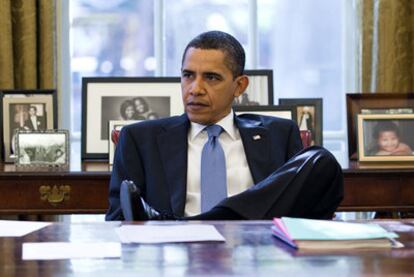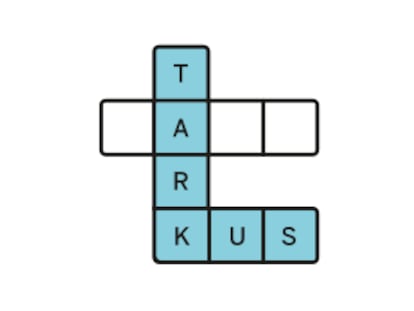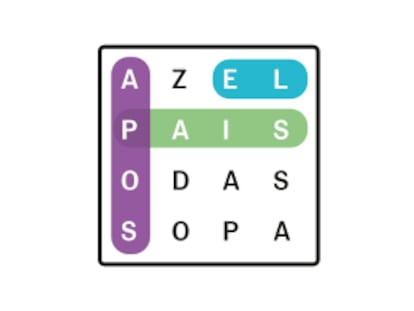Texto original en inglés de la entrevista a Obama (the whole document including Obama's answers)
EL PAÍS publica hoy una entrevista al presidente de EE UU que fue realizada mediante un cuestionario. Este es el documento íntegro con sus respuestas / EL PAÍS publishes today an exclusive interview with the US president, carried out via a questionnaire. Here is the whole document including Obama's answers
In your opinion, what is the most important reason why Spaniards should continue to risk their lives in Afghanistan?
First, let me express my gratitude for the efforts and sacrifices Spain has made in Afghanistan. I believe Spain is committed to the mission in Afghanistan for the same reason we and our other NATO allies are: to ensure the security of your country and to protect the Spanish people from attacks by al Qaeda and its affiliates by denying them safe haven in Afghanistan. Spain knows firsthand the anguish and sorrow of senseless terrorist attacks. Al Qaeda remains the number one terrorist threat to Europe at this time, and al Qaeda leaders have continued to broadcast their intention to attack Europe and America.
NATO remains committed to the Afghanistan mission. Our joint commitment to helping Afghanistan become stable and secure is of vital importance to U.S. and European security. Together with our international partners, including Spain, the United States is focused on defeating al Qaeda and its extremist allies, and helping the Afghan National Security Forces increase their capacity so that they can assume responsibility for securing the Afghan people against external and internal threats. This effort is going to take time and our commitment to Afghanistan and the Afghan people is for the long-term. We cannot turn our backs on the Afghan people as before. NATO's long-term goal of shifting toward a supporting role in Afghanistan is fully shared by the Afghan government. President Karzai has publicly stated the goal of Afghan forces taking the lead in security across Afghanistan by the end of 2014. At this Summit, we expect allies and partners to reinforce their enduring commitment to facilitating a sustainable transition process by announcing commitments of additional trainers and mentors for the Afghan National Security Forces, and by underscoring their long-term support to Afghanistan via a new NATO-Afghanistan Partnership Declaration.
Would you accept a resolution in Afghanistan that required negotiations with the Taliban?
As we've said many times, the U.S. and our NATO partners fully support an Afghan-led process of reconciliation and reintegration that seeks to bring back into society those members of the Taliban who agree to some key points. They must cease their violence, break their ties with al Qaeda and its affiliates and agree to live under the rules of the Afghan constitution, including the provisions that protect the rights of all Afghans. This reconciliation starts with dialogue with the insurgent forces and is and must be led by the Afghans themselves. Our goal is a stable, prosperous and secure Afghanistan. Achieving this will contribute to a much more stable region and a world safer from terrorist threats.
During your last trip you devoted 10 days to Asia and 3 to India. In contrast, you will spend 3 hours in Lisbon with the leaders of the European Union. Is this a reflection of a shift in priorities for United States foreign policy?
With our European friends, we are discussing how we can promote stability, liberty, and prosperity, for our peoples and the benefit of those around the world. Developing new partnerships in other regions of the world does not come at the expense of our relationship with Europe. It is in both our interests - and I think my European partners would agree as we see Europe also deepening its ties with others around the globe as well. The fact is that wherever we face a challenge, the United States consults with Europe and works with Europe to address it - and we do so because of our shared values and ideals.
The agenda and the expected outcomes of the NATO and U.S.- EU Summits speak to the breadth and depth of the relationship the United States has with Europe. As these two Summits demonstrate, the United States and Europe work together across the full range of international security and global economic issues. The discussions that I will have with my NATO and EU colleagues and the decisions we will make together are the kind that we can only undertake with our closest allies and partners. A large part of what we will discuss at these two Summits is how we, together, can promote global security and prosperity.
What do you see as NATO's functional role once there is resolution in Afghanistan?
The North Atlantic Treaty Organization's overarching mission is to protect the people and territory of its members from harm - collective defense has been NATO's mission since the creation of the Alliance. NATO invoked Article 5 of the Washington Treaty after September 11, 2001, and NATO commands the International Security Assistance Force in Afghanistan to promote our collective defense.
At Lisbon, we expect to adopt a new Strategic Concept that will affirm our shared values as allies and our commitment to each other's defense. The new Strategic Concept identifies new threats that we will jointly defend against - such as international terrorism, malicious cyber activities, proliferation of WMD and their means of delivery, and other challenges. The new Strategic Concept recognizes that modern threats require a global response, and so it places a premium on NATO's partnerships with other countries and organizations - which is very similar to our own National Security Strategy.
The last Strategic Concept was written in 1999, before the attacks of September 11, 2001. The new Strategic Concept makes clear that international terrorism and instability in foreign lands can directly threaten the Alliance, and that crisis management and response - including adoption of a comprehensive civilian-military approach - will be an important tool for NATO going into the future, just as it is was for NATO operations in the Balkans, and is now for NATO operations in Afghanistan. The Strategic Concept also restates our commitment to keep the NATO door open to all European democracies that meet the standards of membership.
NATO is the most successful alliance in history because it is built on a fundamental and enduring premise that has stood for over 61 years: because we share the same values, we share the same security challenges - challenges that are addressed more effectively together. Between the vision laid out in the new Strategic Concept, and the decisions taken to develop critical capabilities - to include adopting territorial missile defense as a NATO capability - the Lisbon Summit will provide the kind of visionary guidance needed to transform NATO and ensure that it is as successful in the future as it has been in the past.
Do you feel the economic crisis has diminished Spain's ability to play a key role in international policy?
The economic crisis has been a profound challenge to many countries including ours. Like us, Spain is working to make the needed adjustments and restore growth, and is garnering respect for those efforts. On the international stage, we are all working together to secure a strong and durable recovery. Spain continues to play an important role in that process. And Prime Minister Zapatero and I were just in Seoul for an important meeting of the G20.
From the perspective of US foreign policy, what do you see as Spain's role in future relations with Cuba and in general, Latin America?
Given the deep historic, cultural, economic, and family ties that both the United States and Spain have with countries throughout the Americas there is a wide range of opportunities for our two countries to work together to advance shared goals. Spain is a valuable partner on key challenges facing the Americas today helping defend core democratic values; secure a clean energy future; and enhance the safety and security of citizens in everyday life. My Administration has worked closely with President Zapatero's government on these and other vital hemispheric issues and I look forward to a continued close partnership.
After the results of November's Mid-term elections, do you feel the same enthusiasm to "change the world" as you once said?
Yes, I do. Change is hard, and it takes time, but people, whether it be in the United States or around the world, want to create a better future for themselves, their children, and future generations. To that end, I have been focused on revitalizing our alliances in Europe and Asia, building new partnerships, addressing the international economic crisis through cooperative efforts in the G-20, and aggressively working to protect against the threat of terrorism we face.
I believe we have made great strides in re-establishing American leadership and engaging with leaders and people around the world. As I travel to summits like the NATO and EU summits in Lisbon, I sense a genuine interest on the part of other leaders to work with the United States to address the great challenges we face in common. These two summits in particular are important because they concern our collective security and our economic well being.
I will share with you that I was inspired by my recent visit to India where I visited the residence where Gandhi stayed in Mumbai - Mani Bhavan. It served as a powerful reminder that even one man can make a difference. So, I remain as committed as when I was sworn-in as President to continue to work hard to promote peace, prosperity, and security.
Do you still believe it's better to be a good president for one term than a bad president who gets reelected?
A8: I still believe I would rather be a really good one-term president than a mediocre two-term president. I have said more than once that there's a tendency in Washington to think that the job description of elected officials is to get re-elected. That is not our job description. Our job description is to solve problems and to help people.
I will not slow down in terms of going after the big problems that face America. Asia is not slowing down. Europe's not slowing down. They're worried about their economies, their kids, their nation's security - the very same things Americans are worried about.
I don't want to look back on my time here and say to myself, all I was concerned about was nurturing my own popularity. That is not my goal. My obligation is to make sure that I stick to the principles and beliefs and ideas that will move America forward and strengthen our partnerships around the world.








































































